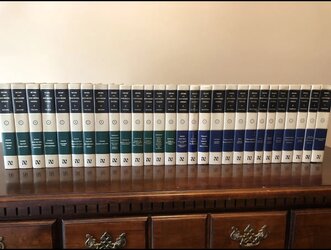this /pol/tard shit i keep seeing pissed me off so i effortposted
View attachment 5972594View attachment 5972596
There's a lot of misunderstandings in this post, so I'll respond with my own efforpost.
The modern Ashkenazi Jew is not related to the biblical Israelites at all.
I'm not going to engage in autism about DNA and blood quanta (and I don't know enough about that anyway), but this is copium. For centuries, European Christians had zero issue identifying Ashkenazim as the biblical Israelites who rebelled against God and killed his son, their messiah. Their covenant with God was abolished and the church took their place as a New Israel. The establishment of the modern state of Israel throws this whole theology on its head, because it sure looks like the old covenant is still in force. If you don't care about historical truth, you can get around this by claiming that modern Jews are a totally different group than biblical Jews, despite no one believing this until five minutes ago. It also solves the thorny issue for racially antisemitic Christians that they are literally worshipping a Jew. (Incidentally, Hortler's solution was to maintain that Jesus was an Aryan, the son of a Roman soldier, ironically adopting a Talmudic and Roman anti-Christian polemic).
The most important cultural distinctions between Christianity and Judaism (outside of Jesus himself) stem from the legalism surrounding Jewish law (Halakha).
This is a common claim, but it's plainly wrong on the face of it. Historically, Christians have been just as legalistic as Jews, and most of them still belong to churches which continue that tradition. The intricate details of canon law in the Catholic church and the similar system in the Orthodox church are exactly the sort of the legalism you find in halakha. There's no fundamental cultural difference between Rabbi Noseberg arguing over how diluted the kiddush wine can be and Bishop Gyrophagos saying the mass was invalid because the communion wine had additives, and if you claim there is, you're splitting some pretty Talmudic hairs yourself. If you're low-church Protestant, I guess you can throw out two millenia of history and say that none of this has anything to do with real Christianity, but Protestants just moved their legalism from ritual to theology in any case.
As you know, the Jews follow a very small part of the Bible, called the Torah
The Jewish canon includes the whole old testament, including the prophets and writings, which (if you're using the Protestant canon) is over three-quarters of the Christian Bible. Of course, for us this is the entire Bible and Christians decided they could add their own stuff a few centuries after the canon was closed, but in any case we don't follow only a "small part" of the Bible.
Which contains very strict rules that determine who God will send to boil in excrement for all eternity. This includes the rules like blended fabrics.
The Torah (as in, the Pentateuch) doesn't say anything like this, and certainly not for wearing blended fabrics. The Hebrew Bible doesn't place a big emphasis on the afterlife in general, and what there is very different than the post-biblical idea of hell that later Judaism developed, and that Christianity inherited. Again, I see no fundamental difference between Christianity and Judaism here. How is boiling in excrement for eternity for wearing blended fabrics (which, mind you, there is no claim about even in the Talmud, and certainly not for gentiles not subject to the Law) different than the historical orthodox Christian belief that a person who does not accept Jesus as their savior (in the precise fashion the relevant denomination specifies), no matter how moral and good they are, is damned to hellfire for all eternity?
Because the Torah is such a small series of writings, what makes up Jewish Halakha is thousands of years of debate between rabbinical scholars.
This is true enough, in exactly the same way that because the New Testament is so small, what makes up Christian practices and beliefs is thousands of years of debate between Christian scholars. Here's a very imposing set of the writings of the church fathers:

The Talmud is often thought of as a single book, but the real Talmud is as large as an encyclopedia set.
Actually, the Talmud is relatively short, like most other ancient works, and you can comfortably fit it in a single volume. The length of the modern sets is because of the extensive medieval commentaries that have become standard additions since the invention of the printing press and/or translations, like I imagine the case is with the above set of early Christian writings. Here's a picture of the only extent medieval manuscript of the complete Babylonian Talmud, which includes other rabbinic writings besides:

These books are very similar looking to a to a row of legal books you'd see in a lawyer's office on the shelf behind them, because it is the same thing. Jews study what amounts to 2000 years of legal study, entirely between men of Earth, Rabbinical scholars.
...and? Yes, Christians don't believe the rabbinic claim that the Talmud is authoritative, divinely-originated tradition. I don't believe that the New Testament is the inspired word of God either, and I think that Christians who study it are studying the words of men. What's the argument here, other then "Jews don't believe in Christianity"?
In the Talmud, it is literally written that Jews disobeyed direct orders from God, but then pleased him with their arguments, as if he was an extremely Jewish supreme court judge who was impressed by extraordinarily Jewish legal arguments. As if the commandments of their own God could be disregarded if they manage to out-Jew him.
Putting aside your (incorrect) summary of the story, this simply isn't the way Rabbinic Judaism works. For example, the Torah states that one can't cook a kid in it's mother's milk. The rabbis interpreted this as including all mammals, not just goats, and they also believed it included not just cooking together but even eating any sort of dairy and meat mixture. This then got extended to include poultry and ended up with the current Jewish practice being to wait *six hours* between eating meat and dairy, and Orthodox Jews keep entirely separate sets of dishes for them. You can certainly argue that this is legalism taken to an absurd, but this definitely isn't being being done to "cheat God" or make our lives easier. I can add dozens of other examples - the halakhic laws of menstrual purity are far stricter then Leviticus mandates. Ritual slaughter is required for all animals, not just domesticated ones. Animals are considered non-kosher even if they weren't killed by predators, but merely have some internal lesion in their lungs. In the vast majority of cases, the rabbinic interpretation of the Torah is stricter then the plain text implies. Saying "Jews think they can disobey God's commands by out-lawyering him" while ignoring all evidence to the contrary is just as foolish as me saying that Christians are Rekieta-style libertines who thing it's cool to visit Hedonism II because Jesus paid the toll already. And once again, even if taken at face value, this is a hypocritical claim if made by a Christian, who believes that Peter got the OK from God to abolish all the dietary laws and that it's totally cool for Paul to just say that circumcision is no longer commanded. When Rabbi Yehoshua (allegedly) does it, it's sneaky Jewish rules-lawyering. When Rabbi Jesus does it, it's all kosher.
TL;DR - Yes, Christianity is just Judaism for gentiles, and yes, we always win, goy.


